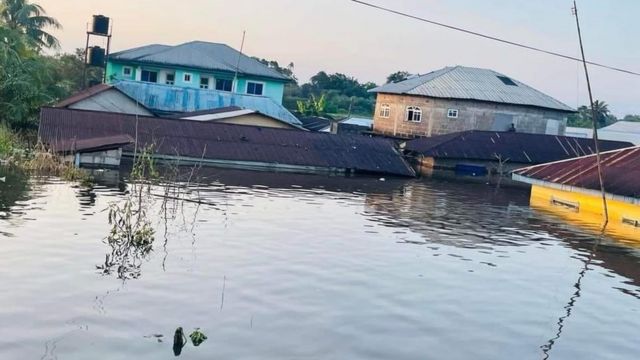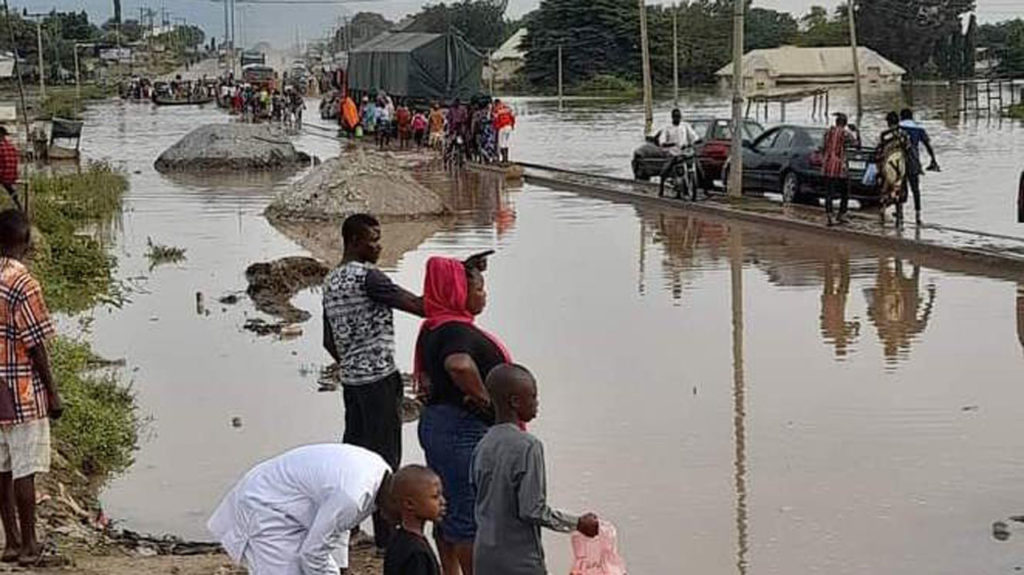Nigeria is currently suffering its worst flooding crisis since 2012. For months, these floods have forced thousands of people out of their homes.
[Image Source: NEMA via AP]
According to the Federal Government, the disaster has directly affected more than 2.5 million Nigerians with over 600 dead. The floods have caused untold hardship in 31 states, damaged more than 80,000 houses, and destroyed farmlands.
Zikoko Citizen interviewed three people affected by the floods in Rivers, Kogi, and Delta.
Gloria, 28 (Rivers State)
For Gloria, living with floods isn’t a strange thing. Nigeria hosts seasonal floods annually and she’s witnessed enough of those in her hometown of Omoku, Rivers State, for as long as she can remember. But, she’s never seen floods like the one that has now left her homeless.
She told Citizen, “I’ve moved from my house to three different locations just this month alone because of the floods. My business has been completely submerged by the floods and I’m living on the little money I managed to save before all of this.”
Gloria was very passionate about helping her fellow Omoku residents who have been left in worse conditions. And the situation makes her furious.
She said, “Do you know people are stuck in remote villages, and can’t come out to Omoku because of this flood? Some schools, despite the floods, are still on. Children go to school with the water at waist level in their uniforms and come back the same way. What if they lose their lives? Many people, responsible people, used to have homes but now they’re sleeping on the streets. We’re suffering bitterly!”
Gloria also has mixed feelings about the government’s response to the crisis. She told Citizen, “Well, I know that our governor (Nyesom Wike) has released ₦1 billion to help certain local government areas (including mine) with the crisis. But I can’t say for certain that the help is useful. At the Internally Displaced Persons (IDP) camp, there’s no light and no mosquito net. I’ve seen the state of those camps and people are falling sick every day. They claimed to have given each camp 30 mattresses but in reality, it’s only three pieces they delivered. Many people at the camp sleep on the bare floors.”

Image Source: Madu Dab Madueke
Theophilus, 32 (Kogi State)
If anyone had told Theophilus that he would lose his family house to floods four years after it was built, he wouldn’t believe it. But that’s exactly what happened.
Theophilus received the shock of his life on September 21, when he arrived home from work to find his house completely submerged.
“I have tried so hard to comprehend with God what I’ve done wrong. I had been saving money for several years, with loans, to build this house. I completed it in 2018, and now all that is gone. My wife and kids have gone from living in a beautiful bungalow in Lokoja to being refugees in an IDP camp. The relief materials can hardly go round . My youngest child has even started developing skin rashes in reaction to the flood water. I can only say that God knows best.”

Image Source: Ibrahim Obansa/Guardian
Demola, 23 (Delta State)
Choosing to serve in Delta State for his National Youth Service Corps (NYSC) program was the worst mistake in young Demola’s life. Since September, the floods have messed up his commute to and from his primary place of assignment (PPA) in Ughelli South.
“I thought coming all the way from Lagos to Delta was going to give me the freedom I wanted from my parents but, omo, I was so wrong. Wearing semi-wet clothes is now the default. I have to trek parts of the journey in water and use a public canoe to reach the school where I serve. I can’t even complain because all the other corpers, teachers, and students are coming in and out in that fashion, so who am I?”
When asked if NYSC would allow him to go back home for safety reasons, he was unsure. “Knowing our government, they hardly ever do anything, but I’m hoping they tell corpers to go home. We don’t deserve to be put under this inhuman treatment in the name of serving this country.”




